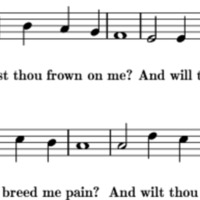Fortune my Foe
Title
Fortune my Foe
Digital Object
About:
This 16th century Irish tune was used, according to Flood (1906), in 1576 for a ballad on the death of a great patron of music, Walter Devereux, Earl of Essex, in Dublin, entitled "Welladay, or Essex's Last Goodnight." The tune appears in several early collections, including William Ballet's Lute Book (1593), Fitzwilliam Virginal Book (where the setting is by the famous English composer William Byrde {1528-1625}), and William Foster's Virginal Book (1624). It was licensed as a ballad in 1565-6 and is mentioned in Shakespeare's The Merry Wives of Windsor (Act II, Scene 3, where Falstaff says, "I see what thou wert, if Fortune thy foe were not, Nature thy friend."). In fact, various songs and ballads came to be sung to the tune, including an early ballad "Titus Andronicus Complaint," on which Shakespeare founded his play, and most of these songs seem to have been about themes of gloom, misery, and death; Chappell (1859) says "Indeed, its mournful character was so thoroughly established that none but the most lugubrious matter seems ever to have been sung to it." The tune appears as "Farewell, Fair Armelia" which appears in Luke Wadding's (the Bishop of Ferns) A Pious Garland of Godly Songs for the Solace of his Friends and Neighbors in their Afflictions, 1680. Early references, according to Flood, also date from 1649-50 from a "contemporary chronicle" which described Irish pipers attached to Lord Inchiquin's army which drew off from Naas to the march of "Fortune My Foe." In 1676 the tune (as it appears in Playford's Choice Airs and Songs) was used by Irishman Thomas Duffet for (one) setting of his lyric "Since Coelia's My Foe" (another setting is set to "Limerick's Lamentation"). "'Fortune My Foe' was sung and played so frequently at public executions that it became known as 'The Hanging Tune'...'Fortune My Foe' originated in Ireland. The setting written here is believed to be the earliest version" (Williamson, 1976, p.39).
Transcription
Fortune, my foe, why dost thou frown on me?
And will thy favors never lighter be?
Wilt thou, I say, forever breed my pain?
And wilt thou not restore my joys again?
In vain I sigh, in vain I wail and weep,
In vain my eyes refrain from quiet sleep;
In vain I she'd my tears both night and day;
In vain my love my sorrows do bewray.
Then will I leave my love in Fortune's hands,
My dearest love, in most unconstant bands,
And only serve the sorrows due to me:
Sorrow, hereafter, thou shalt my Mistress be.
Ah, silly Soul art thou so sore afraid?
Mourn not, my dear, nor be not so dismayed.
Fortune cannot, with all her power and skill,
Enforce my heart to think thee any ill.
Live thou in bliss, and banish death to Hell;
All careful thoughts see thou from thee expel:
As thou dost wish, thy love agrees to be.
For proof thereof, behold, I come to thee.
Die not in fear, not live in discontent;
Be thou not slain where blood was never meant;
Revive again: to faint thou hast no need.
The less afraid, the better thou shalt speed.
And will thy favors never lighter be?
Wilt thou, I say, forever breed my pain?
And wilt thou not restore my joys again?
In vain I sigh, in vain I wail and weep,
In vain my eyes refrain from quiet sleep;
In vain I she'd my tears both night and day;
In vain my love my sorrows do bewray.
Then will I leave my love in Fortune's hands,
My dearest love, in most unconstant bands,
And only serve the sorrows due to me:
Sorrow, hereafter, thou shalt my Mistress be.
Ah, silly Soul art thou so sore afraid?
Mourn not, my dear, nor be not so dismayed.
Fortune cannot, with all her power and skill,
Enforce my heart to think thee any ill.
Live thou in bliss, and banish death to Hell;
All careful thoughts see thou from thee expel:
As thou dost wish, thy love agrees to be.
For proof thereof, behold, I come to thee.
Die not in fear, not live in discontent;
Be thou not slain where blood was never meant;
Revive again: to faint thou hast no need.
The less afraid, the better thou shalt speed.
Ballads using this tune:
- The Bloody-minded Husband
- The Bloody Murtherer
- The Araignement of John Flodder and his wife
- The lamentation of Edward Bruton and James Riley
- The Lamentation of Master Pages Wife of Plimmouth
- The Lamentation of Mr. Pages Wife of Plimouth
- Save a thief from the Gallows, and he'l Hang thee if he can
- The complaint and lamentation of Mistresse Arden
- A cruell murther committed lately upon the body of Abraham Gearsy
- CRIMINALS CRUELTY
- A Looking-Glass for Traytors
- Anne VVallens Lamentation
Sources:
Flood, W, 1906, A History of Irish Music, Brown and Nolan Limited, Dublin, pp. 218-219.
Williamson, R, 1976, English, Welsh, Scottish and Irish Fiddle Tunes, Oak Publications, Michigan.
Williamson, R, 1976, English, Welsh, Scottish and Irish Fiddle Tunes, Oak Publications, Michigan.
Collection
Citation
“Fortune my Foe,” Execution Ballads, accessed February 24, 2026, https://omeka.cloud.unimelb.edu.au/execution-ballads/items/show/1134.

